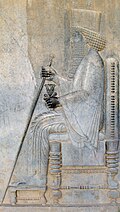Aristagoras
They shared the coast with the Phrygians (proto-Armenians) coming in from the Balkans, but neither were prepared for the armed invasion of their lands by the Persians during the late 6th-century BC.
At Miletus, the Persians killed all the warriors, castrated the young men, and sold the women and children into slavery.
In 492 BC the Persian king Darius would order a naval attack in retaliation against Athens and Eretria for supporting the Greeks in the Ionian Revolt.
By the time extant history hears of him, Aristagoras was already serving as deputy governor of Miletus, a polis on the western coast of Anatolia around 500 BC.
[3] Aristagoras was the main driver of the Ionian Revolt on secret instruction from Histiaeus, when the latter learned of Persian plans to interfere directly in Miletus.
He explained to Artaphernes that Naxos “was a fine and fertile island, close to the Ionian coast, and rich both in treasures and slaves.”[5] It was also the gateway to the Cyclades, which the Persians did not yet rule.
The schism was irreparable with Megabates deciding to sabotage the entire operation by secretly informing the Naxians that they were about to be attacked, taking away the element of surprise.
Now in a position of command, Herodotus is not specific, Aristagoras sent a party under Iatragoras to arrest the admirals still with the fleet, some several men.
In order to gain the participation of the people in the revolt, it was said that Aristagoras "let go" the tyranny and established isonomia, which translates roughly as "equality of government."
The Cambridge Ancient History article attributes this swift arrival to the Persian cavalry, which also had no trouble tracking and catching the Ionians before the gates of Ephesus.
They still held parts of Thrace from their previous abortive expedition into Scythia, only stopped when they learned the true size of the country (most of southern Russia) and the danger of their position in it.
[23] Expecting a swift Persian victory, Aristagoras had hoped to establish a redoubt of Ionians, who would come to the assistance of Miletus at a later time.
[24] By an accidental sequence of historical events his reputation drew the ire of his main historian, Herodotus of Halicarnassus, an Ionian partisan, to such a degree that it suffers yet.
Although a champion of freedom, Aristagoras is the only man in all his Histories that Herodotus openly calls a coward, blaming his supposed flight for the defeat of the revolt.
"[25] Recognizing that he risked arrest or worse at the hands of Artaphernes, Histiaeus escaped that night and took ship at the coast, probably at Ephesus.
Although there was some mild destruction of rebel cities (except for Miletus, which was razed and the population decimated and transported), the Persians were interested in ruling rather than revenge.
While in many ways he reflects some of the best of ancient historiography, on the other hand, his work is sprinkled with motivational and logical lacunae, creating textual paradoxes everywhere, causing some scholars to be critical of his value as a historical source, especially regarding the Ionian Revolt.
Manville had a skeptical view concerning an imaginary power struggle between Aristagoras and Histiaeus isolated from the usual contexts of war and society.
For example, Histiaeus originally won the Great King's favor by protecting his escape from Scythia over a key bridge of the Danube.
The basic problem is Lang's cynicism: "we should not hope to discover the truth about the result merely by accepting the narrative ...."[28] Accordingly, she rehearses a catalogue of paradoxes similar to Manville's weaving her own fantasy of unattested events to contain it.
Her explanation of why such a tale is necessary is similarly speculative: "the failure of the revolt not only gave prominence to every aspect and event which would explain, justify or anticipate the disastrous results but also cast into the shade any intentions which deserved a better fate and any temporary successes during the course of the war".
The fragments of Hecataeus suggest that he wrote only an annal-like sequence long on names and events but short on connecting narrative.
[31] The ancient historians have therefore invented a special category for Herodotus, that he was a logographer, or teller of logoi, based on his own characterization of his sources as logopoeic, "story makers".
Thus Aristagoras personally can be called a “coward.” The lying that they do is metis, "cunning,"[33] an admired Greek virtue practiced by the greatest hero of them all, the crafty Odysseus.
Virgil could include the half-line Timeo Graecos dona ferentes, "I fear Greeks bearing Gifts," in the Aeneid.
As an example of ancient information generally agreed to be invalid, many works attributed to various authors have been placed in the "pseudo-" category after as much as centuries of review.
On the contrary, the main events, such as the Battles of Marathon and Thermopylae, have been accepted as basically credible by many scholars of many ages.
Referring to the Cambridge Ancient History article on the Ionian Revolt by Murray, Georges addresses "the question of Herodotus' veracity and reliability.
"[34] Repeating Murray's criticism that "the traditions concerning the revolt itself are ... fragmented into individual episodes of folly, treachery, or heroism" and therefore are not "trustworthy materials for the history of the revolt," he asserts to the contrary that "Herodotus' account furnishes the material for a coherent and credible account of the actions and events it presents...." Having said this, Georges must now show that, rather than being paradoxical, Herodotus is coherent and credible.
Like Lang, having no other account to offer, he must make his demonstrations from the text of Herodotus, which he spends the rest of the article doing, disputing most of Murray's interpretations.






